-
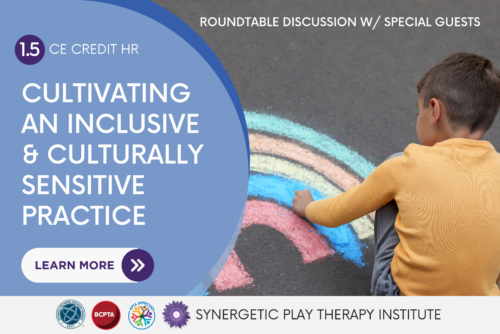
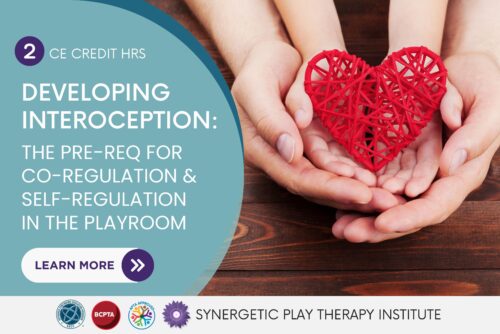 Helping children learn how to regulate is essential, but without first strengthening the child's interoceptive sense, regulation may not be successful. This experiential workshop offers various opportunities to explore how play can develop this fundamental part of the sensory system. As play therapists, there is an understanding that regulation and co-regulation are essential skills that must be developed in order to have successful relationships and manage emotions, and are essential for trauma integration; however, what many play therapists may not fully understand is that there is a prerequisite that needs to be in place for regulation skills to be effective. What has been understood for years in the world of Occupational Therapy is now becoming a primary focus of education for play therapists. This important understanding is that the child’s interoceptive sense, the 8th sensory system that is responsible for letting the brain know how the body is doing, must be developed first before a child can successfully regulate and co-regulate. Without the development and strengthening of the interoceptive sense, a child may have all kinds of regulation knowledge and tools but will not be able to read their own body cues to know when to use any of them. Examples such as knowing when to use the bathroom, when to take a deep breath, when to ask for help, the ability to read non-verbal cues, knowing when emotions are feeling overwhelming, etc. all rely on interoception. This playful workshop is designed to help play therapists learn what the interoceptive sense is and how to use play to develop interoception in their child clients setting the stage for successful regulation and co-regulation. Play therapists will have fun experientially exploring this fundamental part of the sensory system! (This course is a recording of a 2 hour live webinar held in November 2023) See course details below.
Helping children learn how to regulate is essential, but without first strengthening the child's interoceptive sense, regulation may not be successful. This experiential workshop offers various opportunities to explore how play can develop this fundamental part of the sensory system. As play therapists, there is an understanding that regulation and co-regulation are essential skills that must be developed in order to have successful relationships and manage emotions, and are essential for trauma integration; however, what many play therapists may not fully understand is that there is a prerequisite that needs to be in place for regulation skills to be effective. What has been understood for years in the world of Occupational Therapy is now becoming a primary focus of education for play therapists. This important understanding is that the child’s interoceptive sense, the 8th sensory system that is responsible for letting the brain know how the body is doing, must be developed first before a child can successfully regulate and co-regulate. Without the development and strengthening of the interoceptive sense, a child may have all kinds of regulation knowledge and tools but will not be able to read their own body cues to know when to use any of them. Examples such as knowing when to use the bathroom, when to take a deep breath, when to ask for help, the ability to read non-verbal cues, knowing when emotions are feeling overwhelming, etc. all rely on interoception. This playful workshop is designed to help play therapists learn what the interoceptive sense is and how to use play to develop interoception in their child clients setting the stage for successful regulation and co-regulation. Play therapists will have fun experientially exploring this fundamental part of the sensory system! (This course is a recording of a 2 hour live webinar held in November 2023) See course details below. Eating challenges in children can show up in many ways. From the refusal to eat to eating too much, underneath often lies the need for perfectionism and control. Helping kids take these challenges off their plates involves offering choices and uncovering co-existing issues, as well as providing parental support. This course takes a look at this important struggle.
Eating challenges in children can show up in many ways. From the refusal to eat to eating too much, underneath often lies the need for perfectionism and control. Helping kids take these challenges off their plates involves offering choices and uncovering co-existing issues, as well as providing parental support. This course takes a look at this important struggle. Eating challenges in children can show up in many ways. From the refusal to eat to eating too much, underneath often lies the need for perfectionism and control. Helping kids take these challenges off their plates involves offering choices and uncovering co-existing issues, as well as providing parental support. This course takes a look at this important struggle.
Eating challenges in children can show up in many ways. From the refusal to eat to eating too much, underneath often lies the need for perfectionism and control. Helping kids take these challenges off their plates involves offering choices and uncovering co-existing issues, as well as providing parental support. This course takes a look at this important struggle. Every therapist has been there - in a session with a child who doesn't want to come in the room, a child who doesn't want to do the task, a child who only wants to avoid the issue. This webinar explores what to do when a child client's language and behavior say "no." Join us as we explore resistance, with a focus on differentiating resistance from avoidance and differentiating resistance from the dorsal collapse in the nervous system. Emotional flooding is explored as well.
Every therapist has been there - in a session with a child who doesn't want to come in the room, a child who doesn't want to do the task, a child who only wants to avoid the issue. This webinar explores what to do when a child client's language and behavior say "no." Join us as we explore resistance, with a focus on differentiating resistance from avoidance and differentiating resistance from the dorsal collapse in the nervous system. Emotional flooding is explored as well.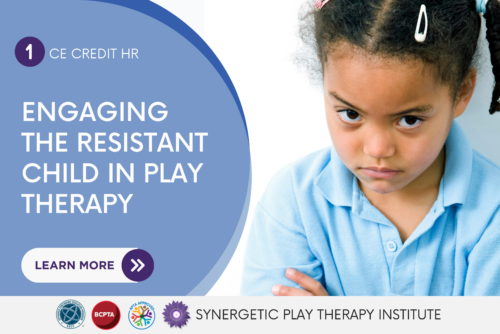 Every therapist has been there – in a session with a child who doesn’t want to come in the room, a child who doesn’t want to do the task, a child who only wants to avoid the issue. This course explores what to do when a child client’s language and behavior say “no.” Join us as we explore resistance, with a focus on differentiating resistance from avoidance and differentiating resistance from the dorsal collapse in the nervous system. Emotional flooding is explored as well.Out of stock
Every therapist has been there – in a session with a child who doesn’t want to come in the room, a child who doesn’t want to do the task, a child who only wants to avoid the issue. This course explores what to do when a child client’s language and behavior say “no.” Join us as we explore resistance, with a focus on differentiating resistance from avoidance and differentiating resistance from the dorsal collapse in the nervous system. Emotional flooding is explored as well.Out of stock
Course Will BE Rescheduled Due to Unforeseen Circumstances!
Please contact the Institute if you have any questions in the meantime!
As a Play Therapist Supervisor supporting supervisees (or as someone on their way to becoming a supervisor), you know that working with children and their families involves a complexity that is like no other, especially when thinking about legal and ethical considerations. When navigating the ethical issues that arise during the play therapy process, we have found that many Play Therapy Supervisors often ask:- What exactly is my role and how do I stay in my role?
- What should my paperwork and documentation look like?
- What are my ethical responsibilities as a supervisor?
- How do I increase my awareness on how cultural diversity impacts play therapy, and thus supervision?"
 In response to COVID-19, the Synergetic Play Therapy Institute began offering free webinars to address the challenges, stress and impact that therapists, teachers, parents, and those on the frontlines were facing. Since then, we've continued to offer free webinars to support you on your professional and personal life's journey. Please enjoy free access to these very special webinars. You may view and share it with as many people as you feel it would help.
In response to COVID-19, the Synergetic Play Therapy Institute began offering free webinars to address the challenges, stress and impact that therapists, teachers, parents, and those on the frontlines were facing. Since then, we've continued to offer free webinars to support you on your professional and personal life's journey. Please enjoy free access to these very special webinars. You may view and share it with as many people as you feel it would help. In this free one-hour webinar, you’ll understand how to manage your stress, fear, anxiety and depression and why it’s important to do so … And that’s not even the best part - You’ll be shown mindfulness strategy after mindfulness strategy, offered understanding of the neuroscience behind each, and guided through how to use them - go from “not just a good idea” to why you would do it and when you would use it.
In this free one-hour webinar, you’ll understand how to manage your stress, fear, anxiety and depression and why it’s important to do so … And that’s not even the best part - You’ll be shown mindfulness strategy after mindfulness strategy, offered understanding of the neuroscience behind each, and guided through how to use them - go from “not just a good idea” to why you would do it and when you would use it. Lisa Dion and her dear friend, Peter Bliss join forces again to support you in staying connected during the Holidays ....with the message that staying calm is not the objective or solution for getting through not only the challenges and uncertainty of the world we live in right now, but also this holiday season (because as we know, it's not always about cheer and jubilee).
Lisa Dion and her dear friend, Peter Bliss join forces again to support you in staying connected during the Holidays ....with the message that staying calm is not the objective or solution for getting through not only the challenges and uncertainty of the world we live in right now, but also this holiday season (because as we know, it's not always about cheer and jubilee). Chances are, you read the title of the webinar and thought, "What! You want me to do what with rejection?!" (We know ... it might not quite make sense yet.) Or perhaps you know that rejection has a purpose in your life, but you still find yourself having a "love/hate" relationship with it. Either way, rejection can be one of the toughest things to experience - it gets right down to your core self and brings up all of your "Am I ok?" feelings. And this is what we're going to talk about in this one-hour free webinar! ... and more specifically, how to embrace it! - like you're best-est of friends (Yes, you heard that right too.)
Chances are, you read the title of the webinar and thought, "What! You want me to do what with rejection?!" (We know ... it might not quite make sense yet.) Or perhaps you know that rejection has a purpose in your life, but you still find yourself having a "love/hate" relationship with it. Either way, rejection can be one of the toughest things to experience - it gets right down to your core self and brings up all of your "Am I ok?" feelings. And this is what we're going to talk about in this one-hour free webinar! ... and more specifically, how to embrace it! - like you're best-est of friends (Yes, you heard that right too.)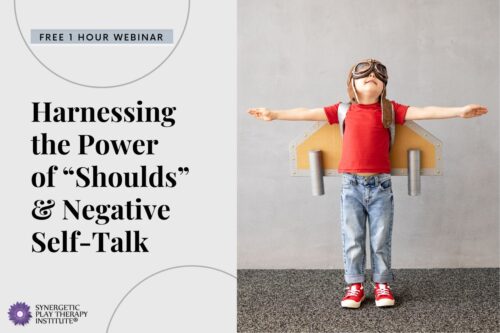 In this workshop, participants will delve into the world of "shoulds" and negative self-talk; those internalized expectations and societal norms that often shape our thoughts, behaviors, and decisions while influencing our lives, physiology, and well-being. During this hour, we will uncover the complex interplay of factors that contribute to the formation of "shoulds" and most importantly, the unique role they play in our psychology. Understanding how “shoulds” and negative self-talk form, the connection they have with our physiology, and the purpose behind them will help you reframe these patterns as valuable feedback systems on the pathway toward authenticity and congruency. Don’t miss this opportunity to learn how to harness the power of “shoulds” and negative self-talk for personal growth and self-discovery! And, one of the best parts is that you will be able to take this information and have a better understanding of what is happening with your clients and loved ones, as well!
In this workshop, participants will delve into the world of "shoulds" and negative self-talk; those internalized expectations and societal norms that often shape our thoughts, behaviors, and decisions while influencing our lives, physiology, and well-being. During this hour, we will uncover the complex interplay of factors that contribute to the formation of "shoulds" and most importantly, the unique role they play in our psychology. Understanding how “shoulds” and negative self-talk form, the connection they have with our physiology, and the purpose behind them will help you reframe these patterns as valuable feedback systems on the pathway toward authenticity and congruency. Don’t miss this opportunity to learn how to harness the power of “shoulds” and negative self-talk for personal growth and self-discovery! And, one of the best parts is that you will be able to take this information and have a better understanding of what is happening with your clients and loved ones, as well! Therapists and clinicians are always experiencing a secondary impact when working with clients who have experienced or are experiencing trauma, crisis, or challenge. A big statement, we know, but it's true. We can't avoid being impacted and it has a lot to do with the brain's mirror neuron system. When we're in the midst of listening or playing through the trauma with the child, we're tracking our client's non-verbal cues. And as we're tracking our client's non-verbal cues, their non-verbal cues are giving us insight into what is happening within them. THIS puts us directly IN the experience with our clients. We'll experience the fear together, the anxiety together, the sadness together, the overwhelm together - Whatever is going on, we'll experience it together including the trauma. That's why we would love to have you join us for this FREE 1-hour webinar to help you navigate the secondary traumatization that can often come along with this profession that we love!
Therapists and clinicians are always experiencing a secondary impact when working with clients who have experienced or are experiencing trauma, crisis, or challenge. A big statement, we know, but it's true. We can't avoid being impacted and it has a lot to do with the brain's mirror neuron system. When we're in the midst of listening or playing through the trauma with the child, we're tracking our client's non-verbal cues. And as we're tracking our client's non-verbal cues, their non-verbal cues are giving us insight into what is happening within them. THIS puts us directly IN the experience with our clients. We'll experience the fear together, the anxiety together, the sadness together, the overwhelm together - Whatever is going on, we'll experience it together including the trauma. That's why we would love to have you join us for this FREE 1-hour webinar to help you navigate the secondary traumatization that can often come along with this profession that we love! Oh yes! You likely know what we're talking about ... the feeling of never being "good enough" ... holding yourself back because of pervasive feelings of shame and self-doubt ... the constant worry/anxiety of not measuring up or fear of being outed as a fraud. It may trap you in a cycle of self-doubt, erode your courage and confidence, undermine your success, and lead to missed opportunities, unfulfilled goals, and a tendency to hide or hold yourself back. Sound familiar?... [Sigh ] ... Let's take a deep breath and acknowledge how challenging and debilitating "imposter syndrome" can be. Lisa wants to help you begin to overcome imposter syndrome in your life.
Oh yes! You likely know what we're talking about ... the feeling of never being "good enough" ... holding yourself back because of pervasive feelings of shame and self-doubt ... the constant worry/anxiety of not measuring up or fear of being outed as a fraud. It may trap you in a cycle of self-doubt, erode your courage and confidence, undermine your success, and lead to missed opportunities, unfulfilled goals, and a tendency to hide or hold yourself back. Sound familiar?... [Sigh ] ... Let's take a deep breath and acknowledge how challenging and debilitating "imposter syndrome" can be. Lisa wants to help you begin to overcome imposter syndrome in your life.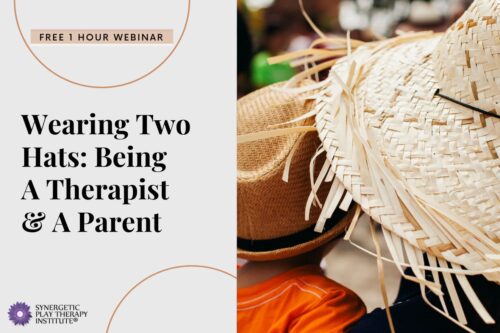 Have you found it difficult, confusing, tiring, or maybe even exhausting wearing your two hats day in and day out? One as a therapist and the other as a parent?... Lisa totally gets it!!...as both a therapist and a parent these past 15 years. This one-hour recorded webinar that will help you discover ways to be the most important toy in both the playroom and in your own home!
Have you found it difficult, confusing, tiring, or maybe even exhausting wearing your two hats day in and day out? One as a therapist and the other as a parent?... Lisa totally gets it!!...as both a therapist and a parent these past 15 years. This one-hour recorded webinar that will help you discover ways to be the most important toy in both the playroom and in your own home! Being a therapist is not an easy job as it requires an on-going commitment to show up day in and day out when your clients need you ... But what happens when the people we are serving aren't the only ones in crisis? What happens when we are in crisis too? (We are human after all). And what happens if it's the same crisis?! In this special one-hour webinar (Part 3 of Regulating Through the Coronavirus webinar series), you'll reconnect to yourself and gain greater internal resources to help you overcome many of the challenges of being a therapist right now.
Being a therapist is not an easy job as it requires an on-going commitment to show up day in and day out when your clients need you ... But what happens when the people we are serving aren't the only ones in crisis? What happens when we are in crisis too? (We are human after all). And what happens if it's the same crisis?! In this special one-hour webinar (Part 3 of Regulating Through the Coronavirus webinar series), you'll reconnect to yourself and gain greater internal resources to help you overcome many of the challenges of being a therapist right now. Divorce. The “D” word. The end of the marital road. A happily ever after run amok. It’s something that often gets a bad rap, especially when we think of the children stuck in the middle. But divorce, while it can be devastating to some kids, can also be a relief for others. Children’s perceptions are not all the same. This course explores how to support children in play therapy when they are experiencing divorce and separation.
Divorce. The “D” word. The end of the marital road. A happily ever after run amok. It’s something that often gets a bad rap, especially when we think of the children stuck in the middle. But divorce, while it can be devastating to some kids, can also be a relief for others. Children’s perceptions are not all the same. This course explores how to support children in play therapy when they are experiencing divorce and separation. Divorce. The “D” word. The end of the marital road. A happily ever after run amok. It’s something that often gets a bad rap, especially when we think of the children stuck in the middle. But divorce, while it can be devastating to some kids, can also be a relief for others. Children’s perceptions are not all the same. This webinar explores how to support children in play therapy when they are experiencing divorce and separation.
Divorce. The “D” word. The end of the marital road. A happily ever after run amok. It’s something that often gets a bad rap, especially when we think of the children stuck in the middle. But divorce, while it can be devastating to some kids, can also be a relief for others. Children’s perceptions are not all the same. This webinar explores how to support children in play therapy when they are experiencing divorce and separation.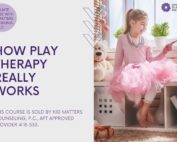 "I could watch Lisa talk about play therapy all day. This workshop gives you really helpful, crystallized ideas and nuggets about the play therapy process and how it allows children to heal. Definitely worth a watch when you're maybe feeling stuck with a specific client, or running out of metaphors to communicate the efficacy of play therapy with colleagues or parents." -Malia Segal Lisa unlocks the therapeutic powers of play in this foundational neuroscience-rich training .... In a profession that is fighting for recognition and to be taken seriously, not fully understanding exactly how play therapy transformation takes place is a void. Without really understanding how attuned play works to bring about lasting change, therapists are left feeling uncertain and missing the language to effectively talk to parents, teachers and other influential people in children’s lives. The therapist's ability to influence other professions to see the value in play therapy is also impacted. This presentation is designed to fill in gaps in the play therapist’s understanding by addressing the answer to this very important question- how exactly does play therapy work? Through presentation and discussion, participants will be taken into the minds and biology of children for an inside look at what goes on that leads to their transformation and healing. With the help of neuroscience, brain development, and interpersonal neurobiology, the “how” will be answered allowing participants to truly understand the process and what exactly is going on in the playroom. This dynamic, eye-opening and thought provoking presentation will empower therapists to begin to move beyond their current framework. This course is for you if you want to ...
"I could watch Lisa talk about play therapy all day. This workshop gives you really helpful, crystallized ideas and nuggets about the play therapy process and how it allows children to heal. Definitely worth a watch when you're maybe feeling stuck with a specific client, or running out of metaphors to communicate the efficacy of play therapy with colleagues or parents." -Malia Segal Lisa unlocks the therapeutic powers of play in this foundational neuroscience-rich training .... In a profession that is fighting for recognition and to be taken seriously, not fully understanding exactly how play therapy transformation takes place is a void. Without really understanding how attuned play works to bring about lasting change, therapists are left feeling uncertain and missing the language to effectively talk to parents, teachers and other influential people in children’s lives. The therapist's ability to influence other professions to see the value in play therapy is also impacted. This presentation is designed to fill in gaps in the play therapist’s understanding by addressing the answer to this very important question- how exactly does play therapy work? Through presentation and discussion, participants will be taken into the minds and biology of children for an inside look at what goes on that leads to their transformation and healing. With the help of neuroscience, brain development, and interpersonal neurobiology, the “how” will be answered allowing participants to truly understand the process and what exactly is going on in the playroom. This dynamic, eye-opening and thought provoking presentation will empower therapists to begin to move beyond their current framework. This course is for you if you want to ...- Integrate the neuroscience behind the therapeutic powers of play therapy
- Better articulate to parents why play therapy works
- How children use toys to understand themselves
 Embark on an enlightening journey with Lisa Dion as she delves into strategies for optimizing the intake process! In this course, you will gain insights into how the foundation of a therapeutic relationship is laid during the intake session and how this extends throughout the entire intake and into the clinical engagement. Lisa will impart valuable lessons on structuring the intake, commencing from the initial point of contact all the way to the conclusion of the session. Witness how Lisa skillfully incorporates key themes from Synergetic Play Therapy®, such as the regulation of the nervous system and a nuanced understanding of how the brain functions, into the intake process. We will also explore the pivotal and validating role of the therapist in the playroom, emphasizing how their presence can significantly influence the dynamics of the therapeutic relationship with the client, family, and beyond.
Embark on an enlightening journey with Lisa Dion as she delves into strategies for optimizing the intake process! In this course, you will gain insights into how the foundation of a therapeutic relationship is laid during the intake session and how this extends throughout the entire intake and into the clinical engagement. Lisa will impart valuable lessons on structuring the intake, commencing from the initial point of contact all the way to the conclusion of the session. Witness how Lisa skillfully incorporates key themes from Synergetic Play Therapy®, such as the regulation of the nervous system and a nuanced understanding of how the brain functions, into the intake process. We will also explore the pivotal and validating role of the therapist in the playroom, emphasizing how their presence can significantly influence the dynamics of the therapeutic relationship with the client, family, and beyond. Every adoption experience is unique, with a wide variety of perceptions. Yet at the heart of many stories is the deep sense of grief and loss, not only for the children but for the parents too. This can show up in and out of the playroom as complex trauma and a struggle with relationships. Healing involves helping children and parents connect to themselves, simultaneously asking therapists to become aware of the impact of the complexity and emotions that also arise within themselves. This course explores this complex issue.
Every adoption experience is unique, with a wide variety of perceptions. Yet at the heart of many stories is the deep sense of grief and loss, not only for the children but for the parents too. This can show up in and out of the playroom as complex trauma and a struggle with relationships. Healing involves helping children and parents connect to themselves, simultaneously asking therapists to become aware of the impact of the complexity and emotions that also arise within themselves. This course explores this complex issue.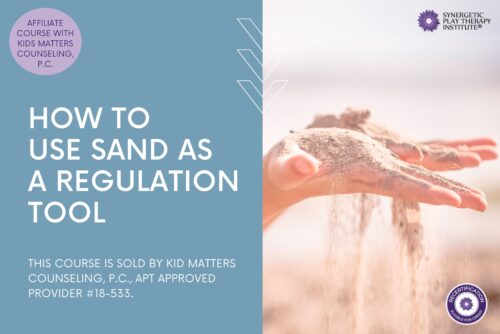 "This was the most significant sand tray training which help me better understand the ways sand can assist in helping regulate/co-regulate our nervous systems. I highly recommend this training to anyone who works with children and adults." -Helen Wilson "Although I consider myself a seasoned play and sand tray therapist I learned so much in just one hour of this course. Highly recommended!" - Marina Keukens Terrell Have you ever wondered how to help children facilitate their processing in your playroom through the use of sand in a nontraditional way? If so, this workshop is for you! The sand tray is a common fixture in play therapy. But thinking outside the “sandbox” allows therapists to use sand in a nontraditional way, fostering regulation. In this engaging workshop the play therapist will learn the 5 toys needed to turn a sand tray into a regulation tool, gain an understanding of how a child can use the sand and the activation in their nervous system as well as be exposed to various ways to bring regulation into the sand tray to help deepen the child’s experience. Join us as we explore the link between sand and the nervous system and discover how the proper tools can deepen both the child’s experience and their healing. https://youtu.be/x4Z4xlOANwU Please see course details below. For a list of all available products, please go here. By clicking "Buy Product" you will be redirected to a payment link provided by Kid Matters Counseling. All payment or course-related questions should be redirected to the affiliate organization, Kid Matters Counseling. Synergetic Play Therapy Institute does not process payment directly for this course.
"This was the most significant sand tray training which help me better understand the ways sand can assist in helping regulate/co-regulate our nervous systems. I highly recommend this training to anyone who works with children and adults." -Helen Wilson "Although I consider myself a seasoned play and sand tray therapist I learned so much in just one hour of this course. Highly recommended!" - Marina Keukens Terrell Have you ever wondered how to help children facilitate their processing in your playroom through the use of sand in a nontraditional way? If so, this workshop is for you! The sand tray is a common fixture in play therapy. But thinking outside the “sandbox” allows therapists to use sand in a nontraditional way, fostering regulation. In this engaging workshop the play therapist will learn the 5 toys needed to turn a sand tray into a regulation tool, gain an understanding of how a child can use the sand and the activation in their nervous system as well as be exposed to various ways to bring regulation into the sand tray to help deepen the child’s experience. Join us as we explore the link between sand and the nervous system and discover how the proper tools can deepen both the child’s experience and their healing. https://youtu.be/x4Z4xlOANwU Please see course details below. For a list of all available products, please go here. By clicking "Buy Product" you will be redirected to a payment link provided by Kid Matters Counseling. All payment or course-related questions should be redirected to the affiliate organization, Kid Matters Counseling. Synergetic Play Therapy Institute does not process payment directly for this course.
JOIN US FOR OUR SIGNATURE PROGRAM AND GROW AS A PROFESSIONAL!
Registration deadline is January 22nd, 2024, 12pm Mountain Time, Denver
CLICK HERE FOR MORE PROGRAM DETAILS!!
Have you been searching for ways to create a deeper impact for your clients? Or perhaps you are:- Looking for game-changing concepts, ideas, and techniques to repattern a child's nervous system and become a more effective external regulator in the playroom?
- Wanting to experience aggressive play, sand, and art from the perspectives of nervous system regulation, attunement, attachment, mindfulness and authenticity?
- Feeling burned out and want to find ways to come back to yourself or feel "green" again, like a new therapist full of curiosity and liveliness?
- Curious how to create a neuroception of safety for both the child and the caregiver to experience deeper integration?
- Wanting to learn a solid play therapy theory that combines the powers of play with interpersonal neurobiology?
- Or just wanting to feel a little more like YOU in the play therapy process?
You will learn how to effectively work with caregivers and what it means to create a neuroception of safety allowing both the child and the caregiver to have a deeper integration.
And if this wasn't enough, you will come to understand the magic of aggressive play, sand and art from the perspectives of nervous system regulation, attunement, attachment, mindfulness, and authenticity.
You'll learn all this while also learning how to avoid burnout and compassion fatigue. Come discover what showing up in the playroom truly means and explore what is happening in the play therapy process, how change occurs, and ultimately what it takes to help children heal at profound levels. And the best part is, you get to be you on the journey!
Check out what past students had to say about their experiences in the course!
"SPT is the missing piece in play therapy. I gained an understanding of who I am in the playroom - a humanness that wasn't there before." -Frances Donohue
*For program details and objectives, see below.

